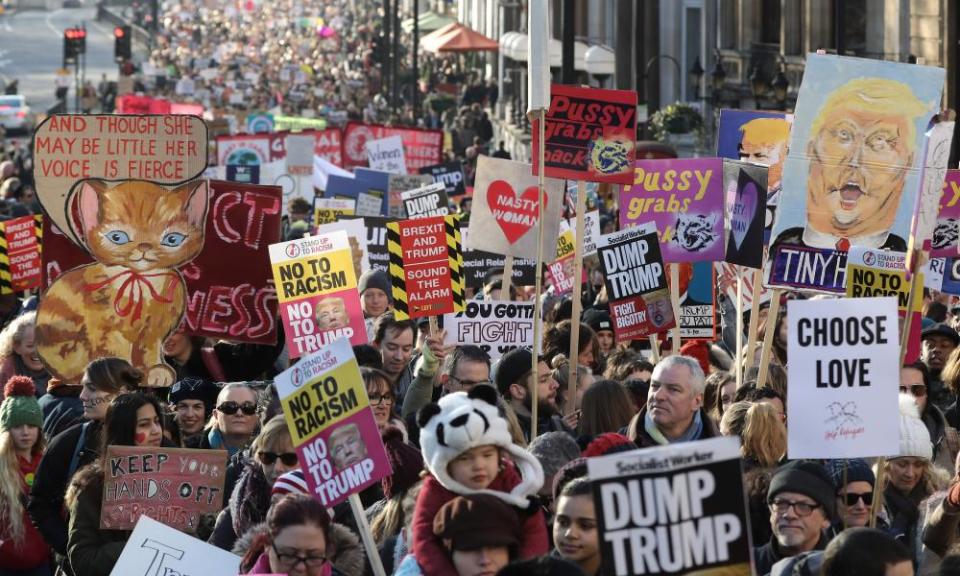Women's March: 30 countries set to take part in third global protest

Women in more than 30 countries around the world are expected to gather on Saturday as part of the global Women’s March, to protest against violence against women and the impact of policies of austerity.
In London thousands are expected to gather outside Portland Place in central London at 12.30pm and march to Trafalgar Square by 1.30pm, ending in a two-hour rally.
Saturday marks the third anniversary of the first Women’s March in 2017, when as many as 6 million people around the world gathered in protest at the election of Donald Trump as president of the United States. Last year thousands gathered in central London for the Time’s Up rally, in honour of the campaign against sexual harassment and honouring the #MeToo movement.
While the global theme of the 2019 Women’s Wave is ending violence against women and girls, the theme of the London march has been named “bread and roses”, in honour of the Polish-born American suffragette and workers’ rights campaigner Rose Schneiderman and reflects marchers’ “hunger to thrive and not just survive on bread”, said organisers. After the Triangle Shirtwaist Factory fire of 1911 where 146 mainly female garment-industry workers died, Schneiderman declared: “The worker must have bread, but she must have roses, too.”
The UK rally is likely to have an anti-Brexit flavour as organisers accuse the government of ignoring the fact that women would suffer the most severe consequences in a post-Brexit Britain.

The phrase “bread and roses” captures a desperate need for women’s voices as the devastating impact of austerity in the noise around Britain’s messy departure from the EU is forgotten, said Dr Shola Mos-Shogbamimu, the founder of the Women in Leadership publication and co-organiser of Women’s March London.
“The 1912 bread and roses march revolutionised workers’ rights for women and once again on Saturday women are leading the way in the fight against austerity,” she said. “We see women bearing the brunt of the economic and social impact of austerity and we know that after Brexit women will bear the brunt of the fallout. Our lives are being held to ransom because of politics.
“We know that post-Brexit Britain will not be any better for women unless assurances are put in place to protect us. Yet none of the conversations happening at the moment are focusing on the impact of women and I find that absolutely ridiculous.”
Sarah Green, of the End Violence Against Women coalition, said the link between austerity and violence against women was marked, adding it was harder than ever for women to challenge injustice as a result of cuts to legal aid and the closing of courts.
“Austerity has been devastating for the life-saving services women rely on,” she said. “Specialist support created by and for women and girls in their communities providing counselling, safe housing, legal help and places of safety have all struggled to stay open because funding has been torn away.”

Some in the movement fear that this year’s march risks being overshadowed by a stubborn controversy in the US, where leaders have been hit by accusations of antisemitism. Both Tamika Mallory and Carmen Perez, co-chairs of the Women’s March in the US, have been linked to the Nation of Islam leader, Louis Farrakhan, who has a history of making antisemitic and homophobic remarks. In November organisers issued a statement saying the movement existed “to fight bigotry and discrimination in all their forms – including homophobia and antisemitism – and to lift up the voices of women who are too often left out.”
Organisers of the global Women’s March have attempted to distance themselves from the controversy, stressing they were an associated but separate movement from the Women’s March in the US, with separate funding and leadership.
The Women’s March Global interim executive director, Uma Mishra-Newbery, said the row, which has led the founder of the Women’s March, Teresa Shook, to call for the current co-chairs to stand down, must not overshadow the vital work being done by the dozens of local Women’s March “chapters” around the world.
“It is disheartening but our focus has to be on the good work that is happening around the world, from the Women’s March Kingston tackling the extreme violence that women face in Jamaica or the Sydney chapter calling out toxic misogyny,” she said. “That’s what keeps us going and we know that we have to stay focused because according to the UN one in three women will experience violence in her lifetime and that is what we should find shocking.”

 Yahoo News
Yahoo News 
